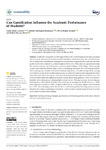Can Gamification Influence the Academic Performance of Students?

Use este enlace para citar
http://hdl.handle.net/2183/30869Colecciones
- Investigación (FEDU) [938]
Metadatos
Mostrar el registro completo del ítemTítulo
Can Gamification Influence the Academic Performance of Students?Fecha
2022Cita bibliográfica
Arufe Giráldez, V.; Sanmiguel-Rodríguez, A.; Ramos Álvarez, O.; Navarro-Patón, R. Can Gamification Influence the Academic Performance of Students? Sustainability 2022, 14, 5115. https://doi.org/10.3390/su14095115
Resumen
[Abstract] Gamification along with a whole range of other active methodologies are being incorporated into university classrooms due to their potential benefits for student learning. The aim of this paper was to analyse how a multimodal learning environment based on gamification could affect the final grades of university students in a subject taught at the Faculty of Education in a spanish university. The research was made up of 133 Spanish university students (Mage = 19.60; SDage = 0.43 years old). A quasi-experimental post-test design with a control group was used. The control group and the intervention group consisted of 66 and 67 students respectively. A multimodal gamified learning environment was set up for the intervention group, in contrast to traditional teaching methods which were reserved for the control group. Each one was implemented throughout an academic year. The results revealed statistically significant differences in the final average grade (p < 0.001), with students from the intervention group obtaining higher overall scores. The same occurred in the voluntary learning tasks, with students from the intervention group earning more Health Points (p = 0.006), more Experience Points (p = 0.005), a higher Total Score (p = 0.002) and a higher Level Achieved (p = 0.002). These findings point to the fact that a multimodal gamified learning environment can influence the academic performance of students. However, more scientific research has to be carried out in order to support these findings.
Palabras clave
Teaching/learning strategies
Gamification
Adult learning
Media in education
Distance education and online learning
Gamification
Adult learning
Media in education
Distance education and online learning
Descripción
Special Issue: Mobile Technology, Gamification and Artificial Intelligence to Improve Sustainability in Education The data presented in this study are not available in accordance with
Regulation (EU) of the European Parliament and of the Council 2016/679 of 27 April 2016 regarding
the protection of natural persons with regard to the processing of personal data and the free circulation
of these data (RGPD)
Versión del editor
Derechos
Atribución 4.0 Internacional






